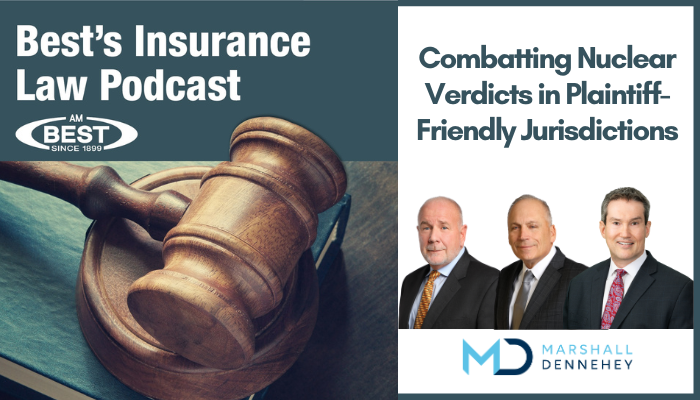Marshall Dennehey Trial Lawyers and Appellate Chair Talk Nuclear Verdicts in A.M. Best’s Insurance Law Podcast
Three attorneys from Marshall Dennehey— John “Jack” Delany, III, Chair of Marshall Dennehey’s Catastrophic Claims Litigation Practice Group, veteran medical malpractice shareholder Gary Samms, and John J. Hare, chair of the firm’s Appellate Advocacy and Post-Trial Practice Group—were featured presenters in a recent episode of A.M. Best’s Insurance Law Podcast. In “Combatting Nuclear Verdicts in Plaintiff-Friendly Jurisdictions,” the trio of attorneys explored strategies for preventing and mitigating nuclear verdicts, particularly in high-exposure litigation.
Gary Samms emphasized the importance of early case preparation. “If I’m waiting to get to the courtroom before I start thinking about [nuclear verdicts], then we’re in trouble, quite frankly,” Samms said. He stressed the need for thorough investigation and expert engagement from the outset: “We want to make sure that we know the medicine, we can communicate the medicine, we have retained experts that can explain it.” Samms also highlighted the role of jury perception: “A bad outcome does not equal negligence in and of itself.”
John “Jack” Delany, III echoed the importance of early strategic planning. “We preach that you have to assemble the A‑team upfront,” Delany said. “If there’s an explosion at a chocolate plant, or a grain mill, or a building collapse… we’re there with things that the typical defense firm does at the end of the case, we do it upfront.” He also emphasized the need for critical thinking and storytelling: “In order to tell a persuasive story, you need to have a strategic plan of how do you get that content for your story.”
John J. Hare discussed the dual role of appellate counsel in high-stakes litigation. “Appellate lawyers can be extremely useful… to help trial counsel and the client win at trial,” Hare explained. “We can focus on research and bench briefs and making dispositive motions that either eliminate the claim entirely or at least limit the opponent’s claims.” He also noted the importance of preserving issues for appeal: “If the case cannot be won in a trial court, it can be won on appeal.”
The full podcast episode is available here: https://legaltalknetwork.com/podcasts/insurance-law-podcast-am-best/202….

